In particular, could this part of her response be true?
"Perhaps I should have also said in my limited 750 words that the laity also need to learn to be less trigger-happy. What you're describing are not major challenges to faith and morals, like having all the laity 'co-consecrate' or things of that sort. They're minor liturgical hiccups that irritate you personally."
You need to know that I was speaking of the breaking of the one cross per altar rule and the replacement of the homily with a few brief words prior to the penitential rite. On the surface level maybe they do look like minutiae.
Lay co-consecration is serious because it is a strong ideological statement about the priesthood of all believers, and a denial of what pertains only to the ordained priesthood.
Yet a brief stroll through the Scriptures shows that God takes unlawful acts very seriously.
In Leviticus 10:1-2 we have two of Aaron’s sons taking a short cut by using ordinary fire for their incense censers instead of fire from the perpetual flame on the altar. God caused the unlawful fire consumed them immediately.
In Numbers 16 we have a lay rebellion, Korah who was descended from Levi but not from Aaron, said to Moses and Aaron, ‘You take too much on yourselves! The whole community and all its members are consecrated, and the Lord God lives among them. Why set yourselves higher than the community of the Lord God?’ What was God’s response? When all the rebels were gathered together in one place, the earth split open and swallowed them all.
And lest we think this was just a caution for Old Testament times, read 1 Cor 11:28-32: ‘Everyone is to recollect himself before eating this bread and drinking this cup; because a person who eats and drinks without recognizing the Body is eating and drinking his own condemnation. In fact that is why many of you are weak and some of you have died. If only we recollected ourselves, we should not be punished like that. But when the Lord does punish us like that, it is to correct us and stop us from being condemned with the world.’
We might then ask, well why hasn’t God done something dramatic about it? The answer might be in 1 Samuel chapters 2 and 3. Here we have the sons of Eli, Hophni and Phinehas, who were scoundrels at the altar of God. It continued for some time. Eli did warn them that sinning against God was truly serious. Then God sent an adult prophet to prophesy judgment on Eli for permitting it to happen, as well as on the two culprits. Later God spoke through the boy Samuel and warned Eli again. When Samuel had grown up, then God’s judgement came swiftly onto the whole family of Eli.
So if God hasn’t acted yet, then He has been sending warnings to both bishop and priest, and when the cup of iniquity is full, God will then act in swift judgement.
But in the meantime, there is a punishment from God that St John of Avila writes about eloquently in ‘Audi, Filia’, it is the utter misfortune of being left by God in your own errors. Because if you are in error, and you don’t know that you are in error, how can you possibly get out of that error? Ponder that until the full horror of that finds a place in your heart.
It is truly a mercy from God when He shines a light into our hearts, let’s us perceive what is wrong, and invites us to change in order to grow closer to Him.
To escape the consequences of error – if God has withdrawn from you -, someone would have to take pity upon you; and plead with God assiduously for your conversion. All of us should be afraid of this punishment; and pray with King David ‘Do not deprive me of Your holy spirit’ Psalm 50(51)11 and ‘God, examine me and know my heart, probe me and know my thoughts; make sure I do not follow pernicious ways, and guide me in the way that is everlasting’ Psalm 138(139):23-24.
So let’s now go through the breaking of the one cross per altar rule and the replacement of the homily with a few brief words prior to the penitential rite and determine whether they are minor liturgical hiccups or not.
The General Instruction of the Roman Missal (G.I.R.M.) has a lot to say about the relationship between the cross/crucifix and the altar. See Appendix A below.
Here we pause for a little and consider that if such precise instructions have been laid out by the Church Universal, then ipso facto these instructions have to be far from trivial.
G.I.R.M 308. 'There is also to be a cross, with the figure of Christ crucified upon it, either on the altar or near it, where it is clearly visible to the assembled congregation. It is appropriate that such a cross, which calls to mind for the faithful the saving Passion of the Lord, remain near the altar even outside of liturgical celebrations.'
In some churches this is done by having a crucifix suspended above the altar, and the processional cross placed on a side wall out of general sight when the entrance procession is over.
When there is a suspended crucifix, then having an additional small portable upright crucifix on the altar to aid the devotion of the priest is not licit. Possibly it would be licit in such cases to have a small crucifix laying flat on the altar – but it wouldn’t be a good thing. It is the crucifix either on or near the altar that denotes that this particular table-like structure is indeed an altar. There is a one-to-one correspondence of crucifix to altar, and this is underlined in the rubrics for the entrance procession when, if there is incense, only the cross and altar are incensed.
This lack of a devotional crucifix on the altar for the priest underscores that in the Mass we are publicly worshipping God, and that the Church – presumably after much argy-bargy in centuries past – came down on the side of clear visible signs for the people of God, and not on the personal preferences of the priest.
Can you now see that an important liturgical principle is at stake here? Liturgy is a public solemn act of worship of God by the Head (Jesus) and members (us) of the Body of Christ. In it is no room for private devotional preferences.
Pope Francis in Desiderio Desideravi 48 says this: 'The rite is in itself a norm, and the norm is never an end in itself, but it is always at the service of a higher reality that it means to protect.'
All of us are custodial servants of this profound gift of Liturgy. It is God’s work, we are but participants by His grace.
Whenever we start thinking of ourselves as masters of the liturgy, with the ability to change parts of it at will according to personal preference, instead of thinking of ourselves as grateful servants, then we have got it very wrong.
Here we come to the missing homily, and this is generally a weekday issue and not a Sunday issue. Yes G.I.R.M. 66b says this, itself a quotation from ‘Inter Oecumenici’:
‘There is to be a homily on Sundays and holy days of obligation at all Masses that are celebrated with the participation of a congregation; it may not be omitted without a serious reason. It is recommended on other days, especially on the weekdays of Advent, Lent, and the Easter Season, as well as on other festive days and occasions when the people come to church in greater numbers.’
And G.I.R.M. 43b
'They should, however, sit while the readings before the Gospel and the responsorial Psalm are proclaimed and for the homily and while the Preparation of the Gifts at the Offertory is taking place; and, as circumstances allow, they may sit or kneel while the period of sacred silence after Communion is observed.'
What is happening locally? First one, and when he left us, now a second priest, has started giving brief remarks prior to the penitential rite, while we are still standing, and then no homily at all, on weekdays. We normally range between 20 and 50 persons for weekday Masses, with greater numbers on Wednesdays and Fridays.
What does that mean in practice? We are standing to listen to commentary on readings which have yet to be read to us, and by the time they are read to us, we have either forgotten the commentary or are scratching our heads to connect the commentary with the readings, unless we have hearing aids and thus have only experienced gibberish. It can become a good guessing game of ‘which readings do the commentary relate to’ – but that isn’t breaking open the Word of God, is it?
There is good reason why the Church places the homily after the readings.
But it goes deeper than that on at least two levels.
The first level of these came home to me when I was visiting an elderly gentleman parishioner in the local hospital. He had been in and out of hospital for the previous few weeks. He was completely alert, albeit a bit uncomfortable, so I was surprised when he kindly and firmly said ‘What I need now is Jesus, only Jesus’. To my even greater surprise he died a few hours later. But what he said has stayed with me, and has resonated with me for over 25 years.
What our frail elderly who show up at Mass every morning need beyond anything else is Jesus, only Jesus. They need their hearts to be refreshed by the wonder of who Jesus is in every homily. Mind you, so do the rest of us as well.
Evangelii Gaudium 135b: ‘The homily is the touchstone for judging a pastor’s closeness and ability to communicate to his people. We know that the faithful attach great importance to it, and that both they and their ordained ministers suffer because of homilies: the laity from having to listen to them and the clergy from having to preach them! It is sad that this is the case. The homily can actually be an intense and happy experience of the Spirit, a consoling encounter with God’s Word, a constant source of renewal and growth.’
Evangelii Gaudium 137: ‘It is worth remembering that “the liturgical proclamation of the Word of God, especially in the eucharistic assembly, is not so much a time for meditation and catechesis as a dialogue between God and His people, a dialogue in which the great deeds of salvation are proclaimed and the demands of the covenant are continually restated”. The homily has special importance due to its eucharistic context: it surpasses all forms of catechesis as the supreme moment in the dialogue between God and His people which lead up to sacramental communion. The homily takes up once more the dialogue which the Lord has already established with His people. The preacher must know the heart of his community, in order to realize where its desire for God is alive and ardent, as well as where that dialogue, once loving, has been thwarted and is now barren.’
The second level is that breaking open the Word of God is the way our hearts are touched and changed; and unless they are touched and changed our reception of Jesus in Holy Communion remains unchanged too.
Romans 10:13b-15a,17 says it all: ‘For everyone who calls on the name of the Lord will be saved. But they will not ask His help unless they believe in Him, and they will not believe in Him unless they have heard of Him, and they will not hear of Him unless they get a preacher, and they will never have a preacher unless one is sent. So faith comes from what is preached, and what is preached comes from the word of Christ.’
Homilies don’t have to be long, they can be extremely brief if only they go some way towards connecting our hearts to Jesus, and opening them in gratitude to the Father. Being in a receptive posture helps too, that is why sitting is important. Remember that standing for those who are frail or unwell or in joint pain is an ordeal.
What isn’t acceptable is a pastor who no longer has an assistant priest being perfunctory about the Mass in order to get on with all his other duties, thereby reducing any homily to an introductory commentary and saving time by returning to the altar (instead of to the presidential chair to sit), thus reducing the time after communion to a minimum, and giving out the concluding prayers from the altar.
Shouldn’t something else get sacrificed instead of preparation to preach the Word of God? Peter and the Apostles thought it of such importance that they appointed deacons to take care of food distribution and other matters. Acts 6:1-6.
If there is anything else in his life for which it is considered necessary to consistently take short cuts in the Mass, then something is seriously wrong. Once in a while, as long as good reason is proffered, is quite a different matter.
It smacks of being master of liturgy instead of being a grateful servant of the liturgy, cutting the liturgy according to personal preference and availability for other things. In some ways this is more dangerous than our lay co-consecration friend. Why? Because the majority of priests and people will sense and abhor the wrongness of lay co-consecration. And because those priests who don’t consider preaching a homily to be an honoured privilege will think it a great idea – and copy him! And because those who don’t mind the shortest Mass possible, will also think it a great idea.
Nothing any of us can do each day can shine even a candle to the magnitude of what the Lord God does in the Mass each day.
Am I being mean? Is this a minor liturgical hiccup? Poor father, he is looking after this whole big parish on his own, who knows how many sick calls, meetings and funerals are on his plate, and all the other calls upon his time and energy. But then I look at the 94 year old who is there rain, hail or shine; and I look at those who have chronically ill husbands at home; and I look at those who come in with a walker; or with the combination of walking stick and Parkinson’s; or who have got there despite failing lungs and failing kidneys; and I suspect that looking upon this combined hunger for Him, Jesus would set Himself to teach them at some length adapted to their capacity, Mark 6:34b.
When it comes to Liturgy nothing that seems to be minutiae actually is minutiae, nor a minor liturgical hiccup only due to personal irritation. More is always at stake than what appears to be on the surface.
Appendix A
GENERAL INSTRUCTION OF THE ROMAN MISSAL
49. When they reach the sanctuary, the priest, the deacon, and the ministers reverence the altar with a profound bow.
As an expression of veneration, moreover, the priest and deacon then kiss the altar itself; as the occasion suggests, the priest also incenses the cross and the altar.
75. The bread and wine are placed on the altar by the priest to the accompaniment of the prescribed formulas. The priest may incense the gifts placed upon the altar and then incense the cross and the altar itself, so as to signify the Church’s offering and prayer rising like incense in the sight of God. Next, the priest, because of his sacred ministry, and the people, by reason of their baptismal dignity, may be incensed by the deacon or another minister.
117. The altar is to be covered with at least one white cloth. In addition, on or next to the altar are to be placed candlesticks with lighted candles: at least two in any celebration, or even four or six, especially for a Sunday Mass or a holy day of obligation. If the diocesan Bishop celebrates, then seven candles should be used. Also on or close to the altar, there is to be a cross with a figure of Christ crucified. The candles and the cross adorned with a figure of Christ crucified may also be carried in the Entrance Procession. On the altar itself may be placed the Book of the Gospels, distinct from the book of other readings, unless it is carried in the Entrance Procession.
122. On reaching the altar, the priest and ministers make a profound bow.
The cross adorned with a figure of Christ crucified and perhaps carried in procession may be placed next to the altar to serve as the altar cross, in which case it ought to be the only cross used; otherwise it is put away in a dignified place. In addition, the candlesticks are placed on the altar or near it. It is a praiseworthy practice that the Book of the Gospels be placed upon the altar.
123. The priest goes up to the altar and venerates it with a kiss. Then, as the occasion suggests, he incenses the cross and the altar, walking around the latter.
308. There is also to be a cross, with the figure of Christ crucified upon it, either on the altar or near it, where it is clearly visible to the assembled congregation. It is appropriate that such a cross, which calls to mind for the faithful the saving Passion of the Lord, remain near the altar even outside of liturgical celebrations.
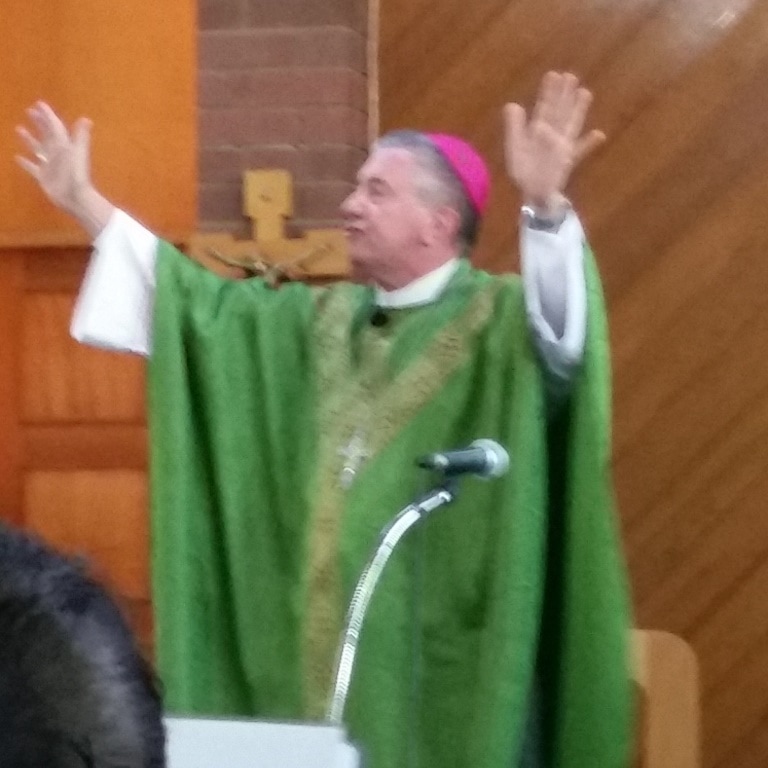
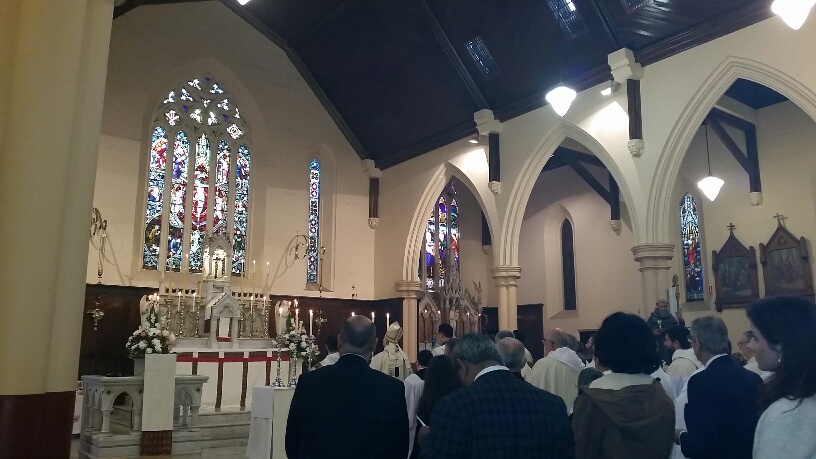
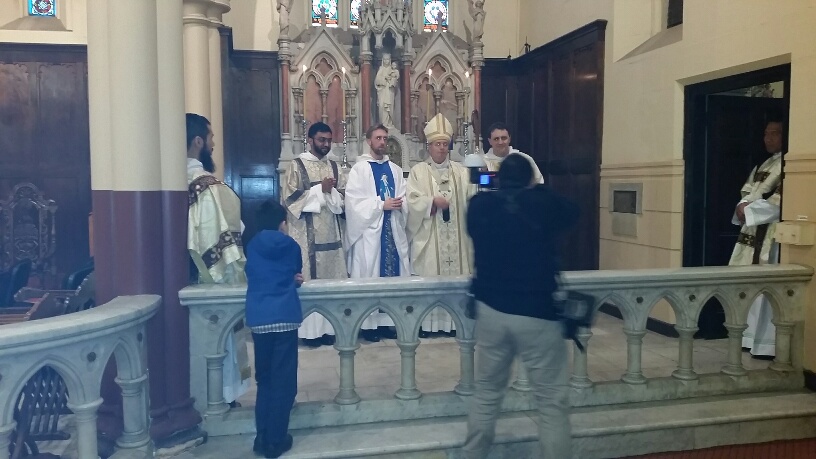
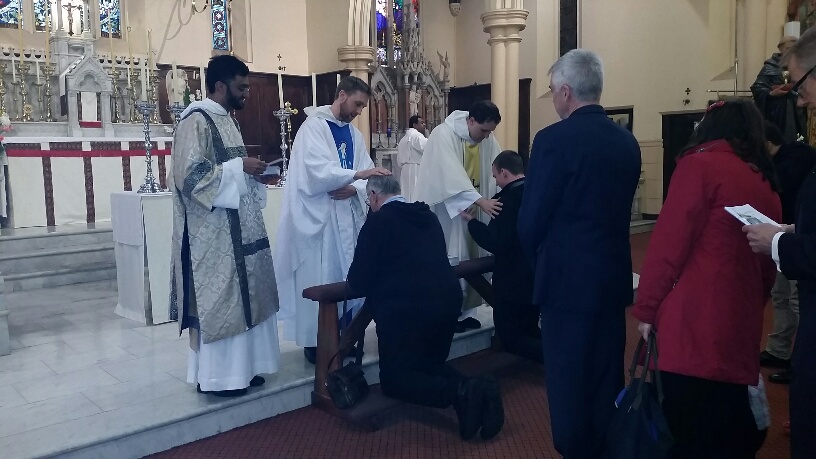
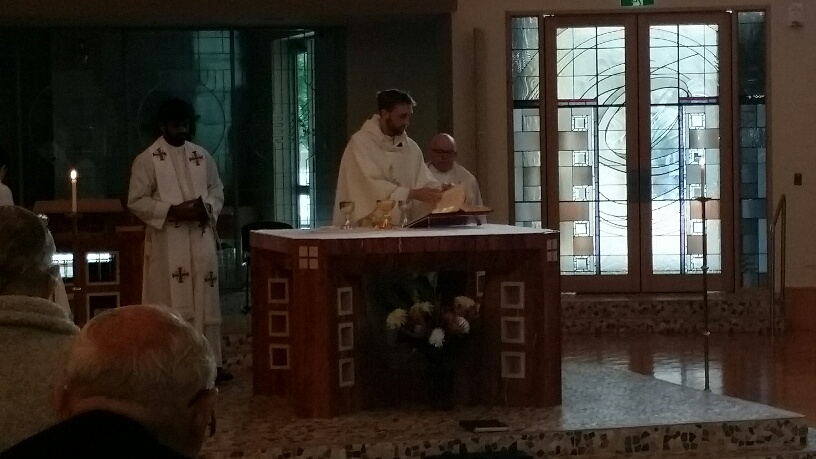
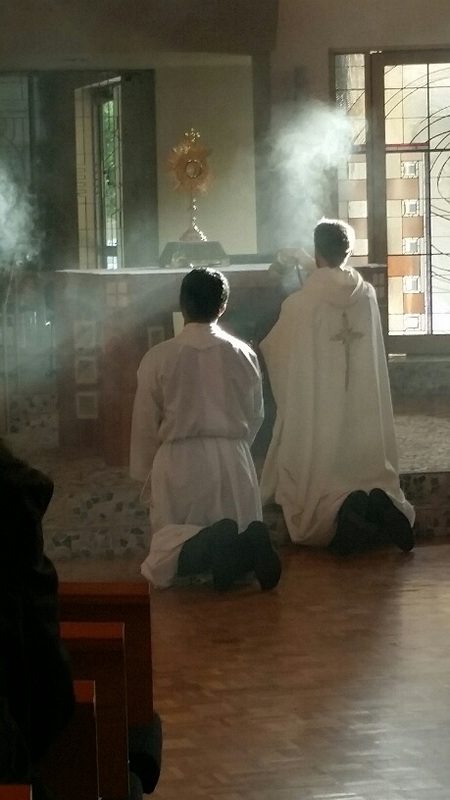
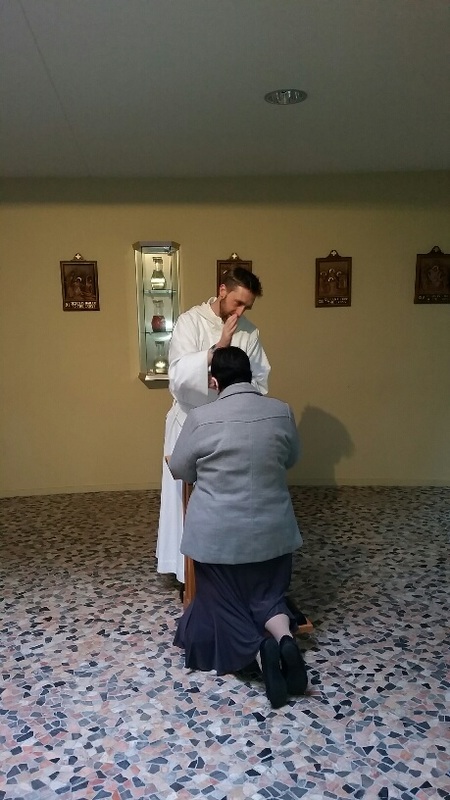

 RSS Feed
RSS Feed